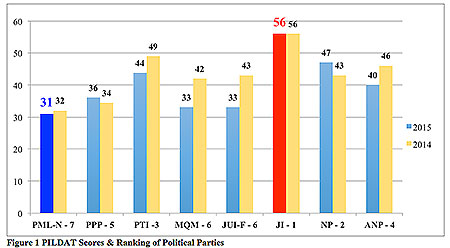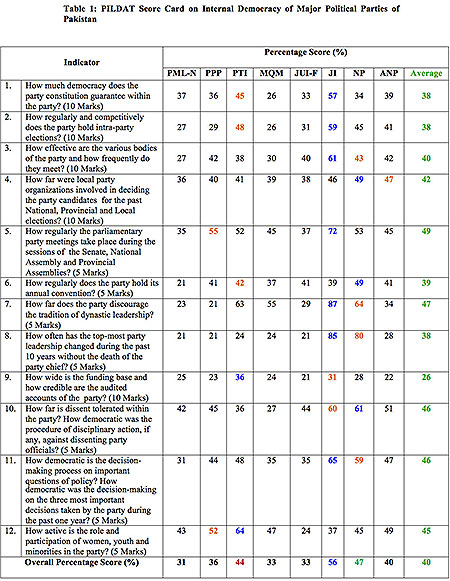| 

PML-N
LEAST DEMOCRATIC PARTY FOR SECOND YEAR IN A ROW; JI RETAINS MOST DEMOCRATIC
RANK; PTI SLIPS TO THIRD POSITION
PILDAT
launches second Annual Report on Internal Democracy of Major Political Parties
of Pakistan : 2015
Highlights:
- Overall quality of political parties’
internal democracy slipped from 43% in 2014 to 40% in 2015
- Most parties mere lengthened shadow of their
leaders
- Intra-party elections mere formality in most
cases
- Parties’ funding shrouded in vagueness;
ECP lacks capacity to check compliance with law
- Parties’ decision-making bodies generally
weak and ineffective
- Next PTI intra-party election a defining event
for internal democracy of political parties
- Lack of co-relation between internal democracy
and mass popularity of parties
February 22:
In a systematic evaluation for the second year (2015) of internal democracy
of political parties in Pakistan conducted by PILDAT, the Jamaat-e-Islami (JI) has
again emerged as the most democratic while the Pakistan Muslim League-Nawaz (PML-N) has
again ranked as the least democratic party.
The PILDAT Report on Internal Democracy
of Major Political Parties of Pakistan 2015 concludes that the
selected eight political parties received an overall score of 40 out of 100,
which indicates a drop from the overall score of 43 in 2014. This shows that
the state of internal democracy of political parties in Pakistan -- although
not in a good shape the previous year- further deteriorated in 2015.
Within this overall score, the indicator of
Parliamentary Parties’ Role in Developing Party Position received the
highest score of 49%. Discouragement of Dynastic Leadership in parties scored
47%, which is the second highest score followed by Tolerance of Dissent within
parties with a score of 46%.
Credibility of political parties’ annual
statements of accounts submitted to the Election Commission of Pakistan and
whether their funding base was wide enough, received the lowest score of 26%.
PILDAT’s 2014 Report had shown somewhat similar results in that the two
weakest indicators were change in top party leadership, lack of credible funding
base and audited statement of accounts.
Regular elections, regular change in leadership
through election, regular meetings of the Consultative Council (Shura)
and the Working Committee (Aamla) and discouragement of dynastic leadership
within the party, have apparently favoured the Jamaat-e-Islami (JI)
rated as the most democratic political party. A landmark amendment was made
in the constitution of the party in October 2015 in which 10 seats have been
allocated for women in the party’s Majlis-e-Shura. Although Jamaat
follows a particular type of internal democracy in which there are no candidates
in party election and election campaign is not allowed, this peculiarity has
not come in the way of the party securing top position as the most democratic
party.
The National Party (NP) (currently
led by Senator Mir Hasil Khan Bizenjo) has emerged as the second most democratic
party of 2015 with an overall score of 47%, which is a significant improvement
over party’s 4th position in 2014. Regular change in top leadership since
its founding in 2003, party conventions successfully conducted in 2015 in which
transparent party elections also took place for all four provincial chapters
of the party, and lack of any sign of dynastic leadership have favoured the
democratic credentials of NP.
On the other hand, the PML-N
has once again ranked as the least democratic party. Irregular or no party meetings,
lack of competitive elections and continuation of the same leadership since
the founding of the PML-N are the factors perceived as the
major weaknesses in the democratic character of the party. The PML-N
is followed by the MQM and the JUI-F, rated
as the second least democratic parties among the eight parties evaluated.
In order to assess democracy within political
parties objectively and scientifically, a framework consisting of twelve (12)
indicators was devised by a broad-based Steering Committee constituted by PILDAT.
Eight (8) major political parties were selected for the assessment. Five of
these parties (PML-N, PPP, PTI, JUI-F and MQM)
hold the largest number of seats in the current National Assembly (2013-2018).
Three other parties were chosen to either represent Balochistan (NP)
and Khyber Pakhtunkhwa (ANP) or to capture a peculiar brand
of internal democracy in the form of the Jamaat-e-Islami (JI).
A party-wise account of each of the twelve (12) indicators was compiled after
collecting data from various sources including the political parties. This account
became the basis of quantitative assessment (scoring) for the parties.

The PILDAT Score Card assessing internal democracy
of eight political parties in Pakistan places the Jamaat-e-Islami (JI)
with 56% score (No. 1), the National Party (NP) with 47% score
(No. 2), the PTI with 44% score (No. 3), the Awami
National Party (ANP) with 40% score (No. 4), the Pakistan Peoples
Party (PPP) with 36% score (No. 5), the Jamiat Ulema-e-Islam-Fazlur
Rehman (JUI-F) and Muttahida Quami Movement (MQM)
(Both at No. 6) with 33% score, and the PML-N with 31% (No.7).
The 8 political parties have been evaluated
based on the following PILDAT indicators of internal democracy of political
parties:
- Democratic character of the party constitution;
- Regular and competitive party elections;
- Effectiveness of intra-party structures;
- Role of local party chapters in selecting party candidates
for legislatures and local governments;
- Regular meetings of parliamentary parties;
- Tradition of annual general meetings or conventions;
- Discouragement of dynastic leadership;
- Regular change in party leadership;
- A broad funding base and credible party accounts;
- Tolerance of dissent within party;
- A democratic decision-making process; and
- Active participation of women, youth and minorities in
party affairs
PILDAT noted an almost converse relationship
between the quality of internal democracy of political parties and their mass
popularity. “PML-N, MQM, PPP are popular parties and their weak internal
democracy has not come in the way of their mass appeal,” observed PILDAT
President, Ahmed Bilal Mehboob “Jamaat-e-Islami and the National Party,
on the other hand, are rated the most democratic parties but they seem to have
a very weak mass appeal.”
Mr. Ahmed Bilal Mehboob said that as an organization
carrying out regular research on issues related to the state of democracy in
Pakistan, PILDAT finds this converse relationship of internal democracy and
mass appeal quite worrying. Furthermore, PTI’s internal democracy seems
to be at a defining stage.
PTI’s 2012-13 party elections were among
the most popularly contested and elaborate party elections in the country’s
history, but these turned out to be deeply flawed by the party’s own admission,”
notes the PILDAT report. “Its next election scheduled for 2016 will decide
not only the party’s own democratic credentials, but the success or failure
of this experiment may also decide future trends in the internal party elections
of political parties in Pakistan.”

Full text of the PILDAT Report on Internal Democracy
of Major Political Parties of Pakistan 2015 is available at:
Internal
Democracy Of Major Political Parties Of Pakistan 2015
Executive Summary in Urdu is available at:
Executive
Summmary (Urdu)
Methodology of the study is available at:
Methodology
of Assessment 2015
|